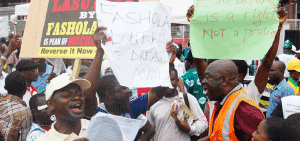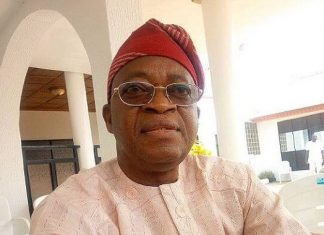Since its creation more than three decades ago, the Lagos State University (LASU) has been moving from one crisis to another, the recent being the protest against tuition fee hike. Reporter, REGINA WHENU, writes on the campaign to make education more affordable in the Centre of Excellence.
When the Babatunde Raji Fashola-led government decided to increase the tuition fees of the Lagos State University (LASU), little did it know that the decision would generate so much fuss. Even if it did, it probably did not envisage a long-drawn-out protest against the decision. The move has, however, raised a lot of dust within and outside the school environment.
Before the hike took effect in January, the students were paying the sum of N25,000 per session. Under the new regime, they are expected to pay between N193,750 and N345,000 per session, depending on their course of study. This has led to a gradual decline in student enrolment.
According to Education Rights Campaign (ERC) and the Democratic Socialist Movement (DSM), the state-owned tertiary institution may be empty soon.
This fact was affirmed by chairman of the Senior Staff Association of Nigeria (SSANU), LASU branch, Adewale Saheed. His words: “Today, LASU has just a little over 12,000 full-time students, and at this rate of decline, by the time current 300 level and 400 level students graduate, LASU may not have up to 5,000 students. As we predicted three years ago, academic and non-academic staff of the university will suddenly wake up one day to find out that their services are no more needed. This is about to happen. There are reports that there is just a student at 100 level of the French Department, six at Islamic Studies and 25 at the Faculty of Law. This is a recipe for mass sack!”
According to Saheed, there has been a drastic drop, compared to the previous years.
“Education is the social responsibility of any government, and for any nation to move forward, the government must invest in the education sector. The student needs to be able to have access to education irrespective of their social background from primary to university level, at least, first degree,” the SSANU boss argued.
Saheed stated that the university should not be a money-making venture, as no amount of fees paid by the student will be enough to take care of the institution.
“How do you expect a parent who earns N18,000 per month to cope with such fees, coupled with other responsibilities like feeding, transport, rent and so on?” he asked.
Saheed revealed that in 2003, students paid N150 and the school still turned out quality graduates.
Also speaking on the issue, a lecturer who wishes to remain anonymous said: “The increase is brutal on us all. Students have reduced and lecturers now have few or no student to lecture in class. We have lost students to schools in Benin Republic, Ghana, etc. due to the increase in fees. There were some lucrative programmes like foundation, part-time, distant learning and satellite campuses being run by the university that were cancelled due to mismanagement, instead of repackaging and making profits. I think the person who sold the idea of increase in school fees deserves to be prosecuted.
“The staff are scared of their job, and soon, it will get to a stage when workers will be redundant due to idleness. A reduction in the school fee will attract more students, programmes will run and then money will be generated.”
Some protesters stormed the Workers’ Day rally at Tafawa Balewa Square on May 1 to demonstrate against the hike. They came bearing placards bearing words that condemned the Lagos State Government. But for the intervention of men of the Nigerian Police, Governor Fashola would have been mobbed.
The Joint Action Front (JAF) had earlier declared May 1 as a day of protest in Lagos against the hike in the fees paid by students of the Lagos State University and other state institutions.
This was disclosed in statement signed by JAF General Secretary, Comrade Abiodun Aremu and Chairman, Dr Oladipo Fashina.
The statement read: “In furtherance to save public education campaign that was started on August 13, 2013, with a mass rally in Lagos and subsequent mass protests in Calabar, Abeokuta, JAF hereby declares May 1, 2014 as a protest day in Lagos”.
Speaking with TheNiche last week, President, LASU Student Union Government (SUG), Nurudeen Yusuf, said his fellow students were not part of the protest.
“We were aware of the protest, but deliberately were not part of it because we already had a protest on March 31 with the National Association of Nigerian Students (NANS) where we addressed the governor on the increase in tuition fees and the governor asked us to draft a proposal. On April 3, we had another meeting with the governor where he told us to check the breakdown of the fees and check where there can be reduction, after which we were asked to come up with a proposal. I took the report to my state cabinet and government council.
“Sequel to that, we had a meeting on campus with all of our students on April 7 seeking their opinion on what the content of the proposal should be. After the meetings, and observing series of opinions, it took five days to draft the proposal, and then we submitted it on April 26. We are still waiting for the response of the governor. It will be dishonourable on our part, if after submitting the proposal, we still embarked on a protest,” Yusuf told our reporter.
He added: “As students’ union leaders, it is an aberration for JAF to discuss with the students without the permission of the students’ union, so we led a protest to JAF on April 30 to make them realise that we are not part of any protest they intend to carry out. We are still expectant of the governor’s response, as we proposed a total of N46,500 for returning students and N65,500 for freshers at the meeting we held.”
Also speaking on Thursday while he addressed the press at the institution’s Ojuelegba campus, Yusuf said “the students have unanimously agreed not to pay the increased fee, as they resume a new session next week until, a reduction is made. Fashola instructed that we should go and look at the breakdown of the fee and come up with how much we want the government to reduce it to.”
On the proposed N46,500 and N65,500 for old and new students respectively, the union leader declared, “we had not received any response from the government since then and we had further written another letter to the governor last week as a reminder.”
He said the hike is unjustifiable and that there is no correlation between the fee and quality of education:
“For instance, N15,000 is charged for teaching practice at the Faculty of Education, like housemanship for medical students, which is a service rendered by the students to the public. We are supposed to be paid for rendering these services and not pay for rendering it.”
“The N350,000 charged as tuition fee for a year without feeding and accommodation is more expensive than in some private universities which charge N450,000 a year with feeding and accommodation.”
Yusuf also decried the dwindling enrolment of students and the dropout rate since the fee hike.
Since its creation more than three decades ago, LASU has been moving from one crisis to the other. But the last four years has particularly been most challenging in the history of the institution established by the administration of the state’s first civilian governor, Lateef Jakande. Primarily, the reason for its establishment was to make tertiary education accessible to residents of the state.













